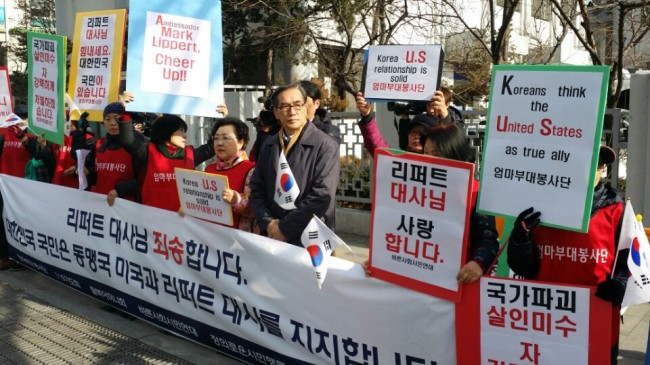Violent crimes in recent weeks across Korea are raising questions of whether the country is still a relatively safe society in the face of terrorist threats and lax gun control.
After two deadly shooting incidents south of Seoul in late February, the U.S. ambassador to South Korea was attacked by a knife-wielding assailant on Thursday.
Despite the geopolitical risks from the inter-Korean confrontation, Seoul had been assessed as one of the safest cities in the world alongside some Asian cities such as Tokyo and Singapore, especially in terms of firearms-related incidents.
The number of guns registered in the country hovered around 160,000 in 2014, less than one in 312 of Korea’s 50 million people.
 |
Civic group members hold a rally to denounce the knife attack on U.S. Ambassador Mark Lippert in front of Jongno Police Station, where his attacker is being held custody. (Yeo Jun-suk/The Korea Herald) |
In Seoul ― where roughly one-fifth of the country’s population resides ― there were only 127 cases of guns being used in major crimes from 2008-2013, according to Rep. Kim Hyun of the New Politics Alliance for Democracy.
A report from the state-run Korea Development Institute, however, showed that the country has seen a continuous increase in criminal offenses. About 3 percent of Koreans are victims of crime each year, with subsequent social costs estimated at more than 16 percent of the nation’s GDP.
Korea also has higher rates of homicide, sex crimes and theft than the Organization for Economic Cooperation and Development average.
Watchers also pointed to the need for strengthened security around public figures such as diplomats, to keep in line with the rising risk of terrorism worldwide.
Until now, Korean police have not protected U.S. ambassadors. The U.S. Embassy has taken charge of guarding their envoys in an attempt to keep their whereabouts confidential.
The police and the National Emergency Management Agency said the authority would bolster guard activities for diplomatic envoys residing in Seoul.
Prime Minister Lee Wan-koo called for increased security around key diplomatic facilities including the U.S. Embassy. He said the government would “spare no effort in protecting foreign envoys” while instructing Home Affairs Minister Jeong Jong-sub and National Police Agency Chief Kang Sin-myeong to investigate the attack.
Experts, however, underlined that the knife attack, albeit the actions of a delusional individual, shed light on the need for better security.
“The assailant claimed to have committed the crime as an act of patriotism. But if that’s the case, he failed to understand that attacking envoys of key countries would cause serious repercussions to the country,” criminal psychology professor Lee Soo-jung of Kyonggi University said.
“This means Kim’s thinking ability has been compromised,” he said.
Korea, meanwhile, is also facing growing calls to bolster its capacity to cope with gun-related incidents.
“In the past, there has hardly been a need to prepare against gun-related incidents because such cases were so few and far between,” said Kwak Dae-kyung, professor at the Police Administration Department of Dongguk University.
He pointed out that the official manual in police stations for dealing with gun-yielding situations lacked specific instructions on what to do. In last week’s shooting spree in Hwaseong, Gyeonggi Province, for example, a police officer was shot dead while approaching the culprit with a taser gun.
“Our best available option is to monitor the distribution of bullets. One potential solution could be to let people receive bullets at the hunting grounds and to have them return the unused bullets after hunting,” he said. “Basically, we have to make gun use as inconvenient as possible.”
The government is mulling whether to put a GPS tracking device on all firearms, but it is unclear how effective it will be with nearly 5,000 guns unaccounted for.
According to data presented by Rep. Lee Cheol-woo of the ruling Saenuri Party, the permits of 14,279 guns were canceled as of 2014, but 4,272 of them were not returned to the proper agencies.
By Kim Yon-se and Yoon Min-sik
(
kys@heraldcorp.com) (minsikyoon@heraldcorp.com)







![[Weekender] Korea's traditional sauce culture gains global recognition](http://res.heraldm.com/phpwas/restmb_idxmake.php?idx=644&simg=/content/image/2024/11/21/20241121050153_0.jpg)
